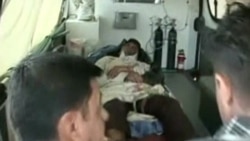Skyrocketing sectarian violence and escalating political conflict in Iraq have some Middle East analysts concerned that Iraq may be on the brink of civil war. The latest upsurge in violence is the worst since the withdrawal of U.S. combat troops.
With sectarian bombings and shootings escalating, April was the deadliest month in Iraq in nearly five years.
The United Nations says more than 700 people were killed.
Abdullah Hassan witnessed one blast in Baghdad.
''What have those innocent people done to deserve this? So many people were either killed or injured," Hassan said.
This is the bloodiest confrontation between Iraq’s minority Sunni community and the predominantly Shi’ite government since the final withdrawal of U.S. troops in 2011.
“The standoff between Iraqi security forces and various Sunni protestors, armed Sunni groups and offshoots of al-Qaida - that is very, very troubling,” said former U.S. ambassador to Iraq James Jeffrey.
The recent upsurge in violence began when government troops raided a Sunni protest site near Kirkuk last month.
The clashes left dozens dead.
Iraqi politics are deeply divided along sectarian lines and the government has been mired
in crisis over how to share power between Shi’ites, Sunnis and Kurds.
The political landscape is paralyzed, according to Sarhang Hamasaeed of the U.S. Institute of Peace.
“The parliament, the Council of Ministers, the Provincial Councils are so much now driven into sectarian and religious and political divisions it is not possible for them to engage in real dialog,” Hamasaeed said.
Analysts say insurgents affiliated with al-Qaida are bombing mosques and other civilian targets in an effort to stoke sectarian conflict.
In 2006-2007 tens of thousands of people died and now there are no U.S. troops to help quell the violence.
“The civil war in the past was related to problems that happened in the past, it was a kind of revenge. But the war today will be for the future of Iraq," said Sarmad al-Taie, an Iraqi political commentator.
Iraqi Prime Minister Nouri al-Maliki has appealed for calm and dialogue.
“I can honestly say that if the sectarian sedition bursts there will not be a winner or a loser, all of us will be losers,” al-Maliki said.
Analysts say Sunni Arab sheikhs who had been urging restraint are now calling for war and reports say some of their followers are preparing to fight.
With sectarian bombings and shootings escalating, April was the deadliest month in Iraq in nearly five years.
The United Nations says more than 700 people were killed.
Abdullah Hassan witnessed one blast in Baghdad.
''What have those innocent people done to deserve this? So many people were either killed or injured," Hassan said.
This is the bloodiest confrontation between Iraq’s minority Sunni community and the predominantly Shi’ite government since the final withdrawal of U.S. troops in 2011.
“The standoff between Iraqi security forces and various Sunni protestors, armed Sunni groups and offshoots of al-Qaida - that is very, very troubling,” said former U.S. ambassador to Iraq James Jeffrey.
The recent upsurge in violence began when government troops raided a Sunni protest site near Kirkuk last month.
The clashes left dozens dead.
Iraqi politics are deeply divided along sectarian lines and the government has been mired
in crisis over how to share power between Shi’ites, Sunnis and Kurds.
The political landscape is paralyzed, according to Sarhang Hamasaeed of the U.S. Institute of Peace.
“The parliament, the Council of Ministers, the Provincial Councils are so much now driven into sectarian and religious and political divisions it is not possible for them to engage in real dialog,” Hamasaeed said.
Analysts say insurgents affiliated with al-Qaida are bombing mosques and other civilian targets in an effort to stoke sectarian conflict.
In 2006-2007 tens of thousands of people died and now there are no U.S. troops to help quell the violence.
“The civil war in the past was related to problems that happened in the past, it was a kind of revenge. But the war today will be for the future of Iraq," said Sarmad al-Taie, an Iraqi political commentator.
Iraqi Prime Minister Nouri al-Maliki has appealed for calm and dialogue.
“I can honestly say that if the sectarian sedition bursts there will not be a winner or a loser, all of us will be losers,” al-Maliki said.
Analysts say Sunni Arab sheikhs who had been urging restraint are now calling for war and reports say some of their followers are preparing to fight.





